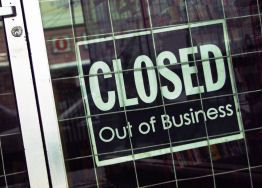Another small biz bites the dust
Oct. 1, 2012
Katy Grimes: The news that another small Sacramento business is closing its doors seems only to draw yawns these days.
The famed Fords Real Burgers, a local Sacramento burger joint since 1987, is being forced out of business by increasing costs, higher taxes, strict regulations, and a local disability lawyer/activist.
“Between a thin margin of profit and increasing costs, we were on a pretty tight edge,” said former owner Pete Vereschzagin, in a Sacramento Bee story.
“The ‘last straw,’ he said, was when Carmichael attorney Scott N. Johnson, who is quadriplegic, wrote a letter to the restaurant about two months ago citing its failures under the Americans with Disabilities Act, including its lack of a disabled parking space and a restroom that could accommodate wheelchair access,” the Bee wrote.
I have followed Scott Johnson’s exploits for several years. Johnson is a quadriplegic Sacramento ADA lawyer notorious for his ruthless shakedowns of tiny businesses, including a local veterinarian, Sacramento area gas stations, another historic hamburger hangout, and numerous other restaurants. Johnson has more than 1,000 lawsuits under his belt.
Johnson has defended his activity and claims to be “an agent of change for the rights of the disabled.” He usually “settles” cases for $4,000 and $6,000.
The typical Johnson approach is to send a letter to a business which states that the business must become ADA compliant. Johnson gives the business formal notice to make changes to the property, or offers to settle with Johnson monetarily to prevent a lawsuit — the shakedown part.
For businesses unaware of the guidelines, or which were compliant at one time and are now unaware of changes to the ADA guidelines, Johnson’s letters are a total shock and very costly.
In addition to paying Johnson off, many of Johnson’s victim businesses end up paying thousands of dollars in expensive remodeling to bathrooms; for entrance and exit doors; and for re-paving and painting parking lots, changing signage, or even having to install expensive wheelchair ramps.
But because there are more than 2,400 provisions in California alone pertaining to disability access in businesses and public areas, no one seems to actually know what the legal standards are, other than some of the more obvious wheelchair requirements. This has allowed many mean-spirited activists to take advantage of the deep, and not-so-deep pockets of businesses.
Fortunately, after many years and many killed bills, Gov. Jerry Brown finally signed ADA reform bill, SB 1186, by Senators Bob Dutton, R-Rancho Cucamonga, and Darrell Steinberg, D-Sacramento, to put an end to these predatory lawsuits by attorneys who use the law to shake down businesses.
But it’s too late for Ford’s Burgers.
Killing off small business
What does it mean for California, as small businesses are killed off?
According to the National Federation for Small Business:
* In California, 1.4 million lawsuits are filed every year
*According to recent NFIB/CA study, 2/3 of all small businesses have been threatened with a frivolous “shakedown” lawsuit over the past several years
*On average, tort/legal costs amount to $838/person-or $3,352/family – each year
A recent study of small businesses in conjunction with Californians Against Lawsuit Abuse showed that more than one-third of small business owners have been sued in the past five years. Nearly 6 in 10 have been threatened with a lawsuit during the same period, and more than three quarters of business owners fear that their business will be sued in the next five years, the NFIB reported. Nearly 40 percent of ADA lawsuits in the nation are filed in California.
“Small business owners are in a funk, just like consumers are,” said Bill Dunkelberg, a professor at Temple University and the NFIB’s Economist. “The exuberance is just not there. In fact, over 70 percent of (NFIB members) say they believe now is a bad time to expand.”
Dunkelberg attributed this funk to several things, including the upcoming Presidential election: the U.S. housing market collapse and high unemployment have created a malaise on consumer confidence. Fluctuating gas prices also have taxed consumers and businesses, he said.
In California, the NFIB represents nearly 20,000 small businesses.
Small businesses make up 99.2 percent of all businesses and create two-thirds of all net new jobs.
75 percent of small businesses pay their business taxes at the individual level, and owners of incorporated businesses pay business taxes as well as personal taxes. Ouch.
Danger, danger
“A slew of tax provisions important to small business are set to expire at the end of 2012,” the NFIB warns. “These expiring taxes add up to an almost $500 billion tax increase for 2013 alone.”
For many small business owners, just as Ford’s Real Burgers announced, these cost increases will put them over the edge. They are running such tight margins already, that one more tax increase, or one more costly regulation, or one more penalty or fee will kill them.
Every time a “For Lease” or “Closed” sign goes up in the window of a former small business, the neighborhood loses a little bit of life. These closures are now coming weekly, no longer just one here and there.
There have been many reports during this recession about the increasing defaults on Small Business Administration loans. Lurking behind each SBA loan default is another small business that’s closed. And when the doors close and a business defaults on a loan, it’s the business owners who pay; the bank liquidates any available collateral including houses and other personal assets.
The next time you see a small business closure, know that those owners have suffered terribly, and may have even had to give up their home or retirement savings to pay off business debt.
But too many lawmakers refuse to acknowledge this when they cavalierly pass tax increases, or impose more absurd regulations on small business.
Big businesses have lobbyists and lawyers, and negotiate deals and exemptions with local and state government. It’s done all the time.
But small business always ends up on the short end of the stick. No wonder small businesses are not hiring, expanding, or making plans for the future in California.
However, small business owners vote.
Related Articles
Bill would push unionizing franchise workers
The franchise market in California, a keystone of small business in the state, soon could change radically. The California
NFIB Helping Liberal Democrats
Steven Greenhut: The state’s business community routinely complains about our state’s abysmal business climate, yet so often these folks undermine
Vindictive Obamacare bills speeding through Legislature
May 9, 2013 By Katy Grimes It’s always good to see the California Legislature proposing more vindictive bills aimed at





